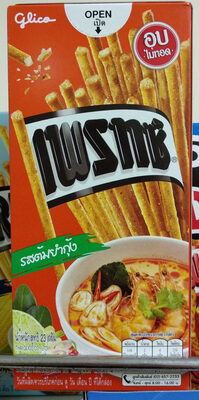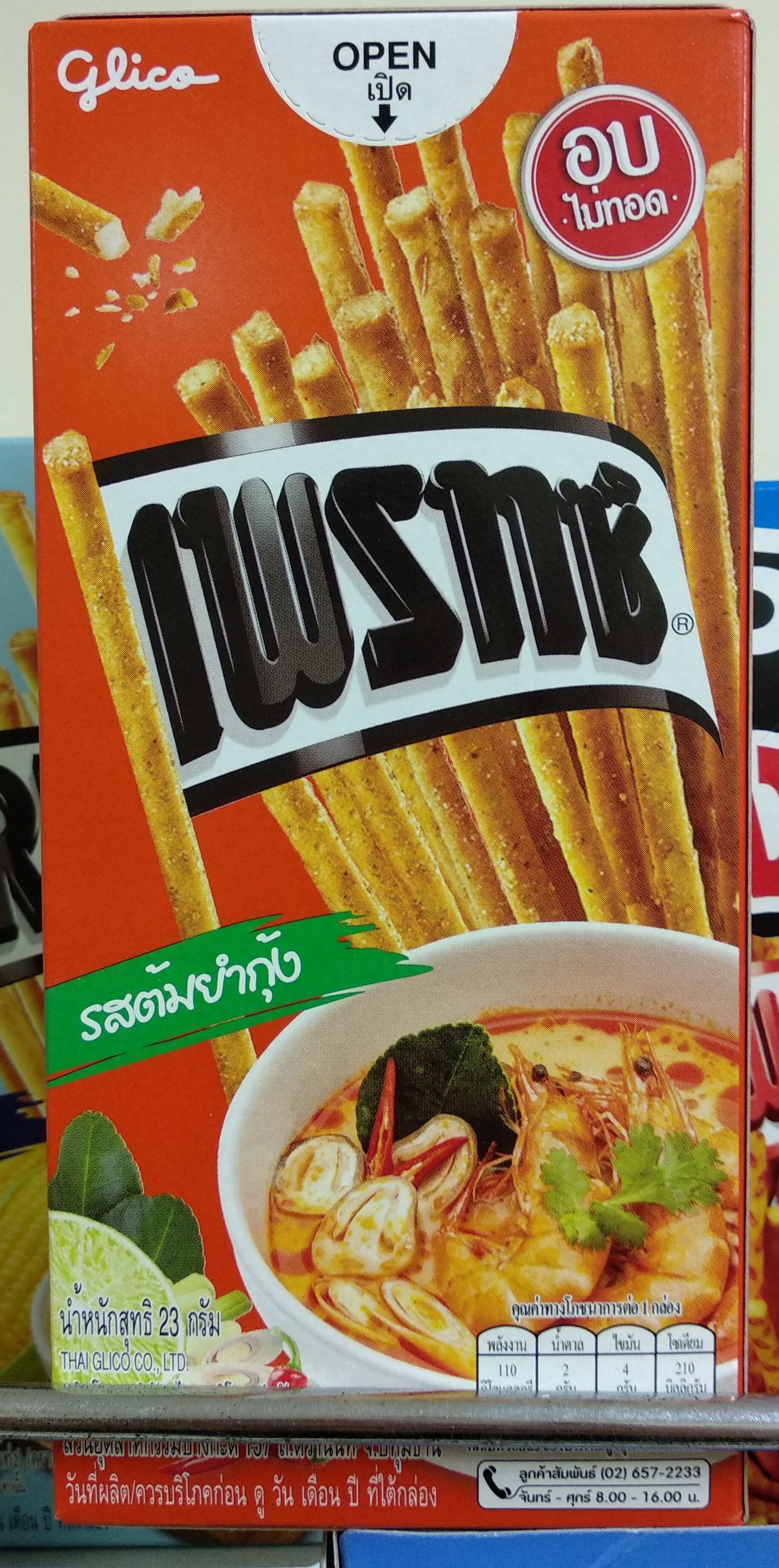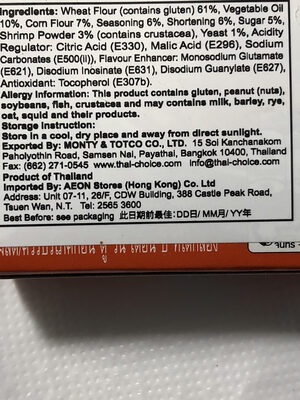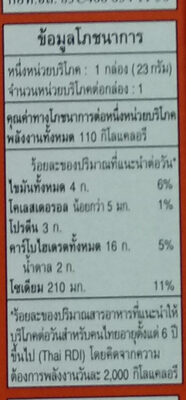Help us make food transparency the norm!
As a non-profit organization, we depend on your donations to continue informing consumers around the world about what they eat.
The food revolution starts with you!
เพรทซ์รสต้มยำ - กูลิโกะ - 23 g
เพรทซ์รสต้มยำ - กูลิโกะ - 23 g
This product page is not complete. You can help to complete it by editing it and adding more data from the photos we have, or by taking more photos using the app for Android or iPhone/iPad. Thank you!
×
Barcode: 8851019030982 (EAN / EAN-13)
Quantity: 23 g
Packaging: Box
Brands: กูลิโกะ, Glico, เพรทซ์, Pretz
Categories: Snacks, Sweet snacks, Biscuits and cakes, Biscuits
Countries where sold: Thailand
Matching with your preferences
Health
Ingredients
-
35 ingredients
Ingredlents: Wheat Flour (contains gluten) 61%, Vegetable Oil 10%, Corn Flour 7%, Seasoning 6%, Shortening 6%, Sugar 5%, Shrimp Powder 3% (contains crustacea), Yeast 1%, Acidity Regulator: Citric Acid (E330), Malic Acid (E296), Sodium Carbonates (E500(il)), Flavour Enhancer: Monosodium Glutamate (E621), Disodium Inosinate (E631), Disodium Guanylate (E627), Antioxidant: Tocopherol (E307b). Allergy Information: This product contains gluten, peanut (nuts), soybeans, flsh, crustacea and may contalns mlk, barley, rye, oat, squid and their products. Storage Instruction:Allergens: Gluten, Molluscs, Nuts, Peanuts, Soybeans
Food processing
-
Ultra processed foods
Elements that indicate the product is in the 4 - Ultra processed food and drink products group:
- Additive: E621 - Monosodium glutamate
- Additive: E627 - Disodium guanylate
- Additive: E631 - Disodium inosinate
- Ingredient: Flavour enhancer
Food products are classified into 4 groups according to their degree of processing:
- Unprocessed or minimally processed foods
- Processed culinary ingredients
- Processed foods
- Ultra processed foods
The determination of the group is based on the category of the product and on the ingredients it contains.
Additives
-
E296 - Malic acid
Malic acid: Malic acid is an organic compound with the molecular formula C4H6O5. It is a dicarboxylic acid that is made by all living organisms, contributes to the pleasantly sour taste of fruits, and is used as a food additive. Malic acid has two stereoisomeric forms -L- and D-enantiomers-, though only the L-isomer exists naturally. The salts and esters of malic acid are known as malates. The malate anion is an intermediate in the citric acid cycle.Source: Wikipedia
-
E307b - Concentrated tocopherol
Alpha-Tocopherol: α-Tocopherol is a type of vitamin E. It has E number "E307". Vitamin E exists in eight different forms, four tocopherols and four tocotrienols. All feature a chromane ring, with a hydroxyl group that can donate a hydrogen atom to reduce free radicals and a hydrophobic side chain which allows for penetration into biological membranes. Compared to the others, α-tocopherol is preferentially absorbed and accumulated in humans.Source: Wikipedia
-
E330 - Citric acid
Citric acid is a natural organic acid found in citrus fruits such as lemons, oranges, and limes.
It is widely used in the food industry as a flavor enhancer, acidulant, and preservative due to its tart and refreshing taste.
Citric acid is safe for consumption when used in moderation and is considered a generally recognized as safe (GRAS) food additive by regulatory agencies worldwide.
-
E500 - Sodium carbonates
Sodium carbonates (E500) are compounds commonly used in food preparation as leavening agents, helping baked goods rise by releasing carbon dioxide when they interact with acids.
Often found in baking soda, they regulate the pH of food, preventing it from becoming too acidic or too alkaline. In the culinary world, sodium carbonates can also enhance the texture and structure of foods, such as noodles, by modifying the gluten network.
Generally recognized as safe, sodium carbonates are non-toxic when consumed in typical amounts found in food.
-
E621 - Monosodium glutamate
Monosodium glutamate: Monosodium glutamate -MSG, also known as sodium glutamate- is the sodium salt of glutamic acid, one of the most abundant naturally occurring non-essential amino acids. Glutamic acid is found naturally in tomatoes, grapes, cheese, mushrooms and other foods.MSG is used in the food industry as a flavor enhancer with an umami taste that intensifies the meaty, savory flavor of food, as naturally occurring glutamate does in foods such as stews and meat soups. It was first prepared in 1908 by Japanese biochemist Kikunae Ikeda, who was trying to isolate and duplicate the savory taste of kombu, an edible seaweed used as a base for many Japanese soups. MSG as a flavor enhancer balances, blends, and rounds the perception of other tastes.The U.S. Food and Drug Administration has given MSG its generally recognized as safe -GRAS- designation. A popular belief is that large doses of MSG can cause headaches and other feelings of discomfort, known as "Chinese restaurant syndrome," but double-blind tests fail to find evidence of such a reaction. The European Union classifies it as a food additive permitted in certain foods and subject to quantitative limits. MSG has the HS code 29224220 and the E number E621.Source: Wikipedia
-
E627 - Disodium guanylate
Disodium guanylate: Disodium guanylate, also known as sodium 5'-guanylate and disodium 5'-guanylate, is a natural sodium salt of the flavor enhancing nucleotide guanosine monophosphate -GMP-. Disodium guanylate is a food additive with the E number E627. It is commonly used in conjunction with glutamic acid. As it is a fairly expensive additive, it is not used independently of glutamic acid; if disodium guanylate is present in a list of ingredients but MSG does not appear to be, it is likely that glutamic acid is provided as part of another ingredient such as a processed soy protein complex. It is often added to foods in conjunction with disodium inosinate; the combination is known as disodium 5'-ribonucleotides. Disodium guanylate is produced from dried seaweed and is often added to instant noodles, potato chips and other snacks, savory rice, tinned vegetables, cured meats, and packaged soup.Source: Wikipedia
-
E631 - Disodium inosinate
Disodium inosinate: Disodium inosinate -E631- is the disodium salt of inosinic acid with the chemical formula C10H11N4Na2O8P. It is used as a food additive and often found in instant noodles, potato chips, and a variety of other snacks. Although it can be obtained from bacterial fermentation of sugars, it is often commercially prepared from animal sources.Source: Wikipedia
Ingredients analysis
-
May contain palm oil
Ingredients that may contain palm oil: Vegetable oil, Fat
-
Non-vegan
Non-vegan ingredients: Shrimp powderSome ingredients could not be recognized.
We need your help!
You can help us recognize more ingredients and better analyze the list of ingredients for this product and others:
- Edit this product page to correct spelling mistakes in the ingredients list, and/or to remove ingredients in other languages and sentences that are not related to the ingredients.
- Add new entries, synonyms or translations to our multilingual lists of ingredients, ingredient processing methods, and labels.
If you would like to help, join the #ingredients channel on our Slack discussion space and/or learn about ingredients analysis on our wiki. Thank you!
-
Non-vegetarian
Non-vegetarian ingredients: Shrimp powderSome ingredients could not be recognized.
We need your help!
You can help us recognize more ingredients and better analyze the list of ingredients for this product and others:
- Edit this product page to correct spelling mistakes in the ingredients list, and/or to remove ingredients in other languages and sentences that are not related to the ingredients.
- Add new entries, synonyms or translations to our multilingual lists of ingredients, ingredient processing methods, and labels.
If you would like to help, join the #ingredients channel on our Slack discussion space and/or learn about ingredients analysis on our wiki. Thank you!
-
Details of the analysis of the ingredients
We need your help!
Some ingredients could not be recognized.
We need your help!
You can help us recognize more ingredients and better analyze the list of ingredients for this product and others:
- Edit this product page to correct spelling mistakes in the ingredients list, and/or to remove ingredients in other languages and sentences that are not related to the ingredients.
- Add new entries, synonyms or translations to our multilingual lists of ingredients, ingredient processing methods, and labels.
If you would like to help, join the #ingredients channel on our Slack discussion space and/or learn about ingredients analysis on our wiki. Thank you!
: Ingredlents (Wheat Flour 61%), Vegetable Oil 10%, Corn Flour 7%, Seasoning 6%, Shortening 6%, Sugar 5%, Shrimp Powder 3% (contains crustacea), Yeast 1%, Acidity Regulator (Citric Acid (e330)), Malic Acid (e296), Sodium Carbonates (e500), Flavour Enhancer (Monosodium Glutamate (e621)), Disodium Inosinate (e631), Disodium Guanylate (e627), Antioxidant (Tocopherol (e307b)), soybeans, flsh, crustacea and may contalns mlk, barley, rye, oat, squid and their products, Storage Instruction- Ingredlents -> en:ingredlents - percent_min: 61 - percent_max: 61
- Wheat Flour -> en:wheat-flour - vegan: yes - vegetarian: yes - ciqual_proxy_food_code: 9410 - percent_min: 61 - percent: 61 - percent_max: 61
- Vegetable Oil -> en:vegetable-oil - vegan: yes - vegetarian: yes - from_palm_oil: maybe - percent_min: 10 - percent: 10 - percent_max: 10
- Corn Flour -> en:corn-flour - vegan: yes - vegetarian: yes - ciqual_food_code: 9545 - percent_min: 7 - percent: 7 - percent_max: 7
- Seasoning -> en:coating - vegan: maybe - vegetarian: maybe - percent_min: 6 - percent: 6 - percent_max: 6
- Shortening -> en:fat - vegan: maybe - vegetarian: maybe - from_palm_oil: maybe - percent_min: 6 - percent: 6 - percent_max: 6
- Sugar -> en:sugar - vegan: yes - vegetarian: yes - ciqual_proxy_food_code: 31016 - percent_min: 5 - percent: 5 - percent_max: 4.25
- Shrimp Powder -> en:shrimp-powder - vegan: no - vegetarian: no - ciqual_food_code: 10021 - percent_min: 3 - percent: 3 - percent_max: 2.4
- contains crustacea -> en:contains-crustacea - percent_min: 3 - percent_max: 2.4
- Yeast -> en:yeast - vegan: yes - vegetarian: yes - percent_min: 1 - percent: 1 - percent_max: 1
- Acidity Regulator -> en:acidity-regulator - percent_min: 0.156666666666666 - percent_max: 1
- Citric Acid -> en:e330 - vegan: yes - vegetarian: yes - percent_min: 0.156666666666666 - percent_max: 1
- e330 -> en:e330 - vegan: yes - vegetarian: yes - percent_min: 0.156666666666666 - percent_max: 1
- Citric Acid -> en:e330 - vegan: yes - vegetarian: yes - percent_min: 0.156666666666666 - percent_max: 1
- Malic Acid -> en:e296 - vegan: yes - vegetarian: yes - percent_min: 0 - percent_max: 0.843333333333334
- e296 -> en:e296 - vegan: yes - vegetarian: yes - percent_min: 0 - percent_max: 0.843333333333334
- Sodium Carbonates -> en:e500 - vegan: yes - vegetarian: yes - percent_min: 0 - percent_max: 0.843333333333334
- e500 -> en:e500 - vegan: yes - vegetarian: yes - percent_min: 0 - percent_max: 0.843333333333334
- Flavour Enhancer -> en:flavour-enhancer - percent_min: 0 - percent_max: 0.843333333333334
- Monosodium Glutamate -> en:e621 - vegan: yes - vegetarian: yes - percent_min: 0 - percent_max: 0.843333333333334
- e621 -> en:e621 - vegan: yes - vegetarian: yes - percent_min: 0 - percent_max: 0.843333333333334
- Monosodium Glutamate -> en:e621 - vegan: yes - vegetarian: yes - percent_min: 0 - percent_max: 0.843333333333334
- Disodium Inosinate -> en:e631 - vegan: maybe - vegetarian: maybe - percent_min: 0 - percent_max: 0.713030303030303
- e631 -> en:e631 - vegan: maybe - vegetarian: maybe - percent_min: 0 - percent_max: 0.713030303030303
- Disodium Guanylate -> en:e627 - vegan: maybe - vegetarian: maybe - percent_min: 0 - percent_max: 0.653611111111111
- e627 -> en:e627 - vegan: maybe - vegetarian: maybe - percent_min: 0 - percent_max: 0.653611111111111
- Antioxidant -> en:antioxidant - percent_min: 0 - percent_max: 0.603333333333333
- Tocopherol -> en:vitamin-e - percent_min: 0 - percent_max: 0.603333333333333
- e307b -> en:e307b - vegan: yes - vegetarian: yes - percent_min: 0 - percent_max: 0.603333333333333
- Tocopherol -> en:vitamin-e - percent_min: 0 - percent_max: 0.603333333333333
- soybeans -> en:soya-bean - vegan: yes - vegetarian: yes - ciqual_food_code: 20901 - percent_min: 0 - percent_max: 0.560238095238095
- flsh -> en:flsh - percent_min: 0 - percent_max: 0.522888888888889
- crustacea and may contalns mlk -> en:crustacea-and-may-contalns-mlk - percent_min: 0 - percent_max: 0.490208333333333
- barley -> en:barley - vegan: yes - vegetarian: yes - percent_min: 0 - percent_max: 0.461372549019608
- rye -> en:rye - vegan: yes - vegetarian: yes - ciqual_food_code: 9390 - percent_min: 0 - percent_max: 0.435740740740741
- oat -> en:oat - vegan: yes - vegetarian: yes - ciqual_food_code: 9310 - percent_min: 0 - percent_max: 0.41280701754386
- squid and their products -> en:squid-and-their-products - percent_min: 0 - percent_max: 0.392166666666667
- Storage Instruction -> en:storage-instruction - percent_min: 0 - percent_max: 0.373492063492063
Nutrition
-
Poor nutritional quality
⚠ ️Warning: the amount of fiber is not specified, their possible positive contribution to the grade could not be taken into account.⚠ ️Warning: the amount of fruits, vegetables and nuts is not specified on the label, it was estimated from the list of ingredients: 0This product is not considered a beverage for the calculation of the Nutri-Score.
Positive points: 0
- Proteins: 5 / 5 (value: 13, rounded value: 13)
- Fiber: 0 / 5 (value: 0, rounded value: 0)
- Fruits, vegetables, nuts, and colza/walnut/olive oils: 0 / 5 (value: 0.00329427083333655, rounded value: 0)
Negative points: 16
- Energy: 5 / 10 (value: 2000, rounded value: 2000)
- Sugars: 1 / 10 (value: 8.7, rounded value: 8.7)
- Saturated fat: 0 / 10 (value: 0, rounded value: 0)
- Sodium: 10 / 10 (value: 928, rounded value: 928)
The points for proteins are not counted because the negative points are greater or equal to 11.
Nutritional score: (16 - 0)
Nutri-Score:
-
Nutrient levels
-
Fat in moderate quantity (17.4%)
What you need to know- A high consumption of fat, especially saturated fats, can raise cholesterol, which increases the risk of heart diseases.
Recommendation: Limit the consumption of fat and saturated fat- Choose products with lower fat and saturated fat content.
-
Saturated fat in low quantity (0%)
What you need to know- A high consumption of fat, especially saturated fats, can raise cholesterol, which increases the risk of heart diseases.
Recommendation: Limit the consumption of fat and saturated fat- Choose products with lower fat and saturated fat content.
-
Sugars in moderate quantity (8.7%)
What you need to know- A high consumption of sugar can cause weight gain and tooth decay. It also augments the risk of type 2 diabetes and cardio-vascular diseases.
Recommendation: Limit the consumption of sugar and sugary drinks- Sugary drinks (such as sodas, fruit beverages, and fruit juices and nectars) should be limited as much as possible (no more than 1 glass a day).
- Choose products with lower sugar content and reduce the consumption of products with added sugars.
-
Salt in high quantity (2.32%)
What you need to know- A high consumption of salt (or sodium) can cause raised blood pressure, which can increase the risk of heart disease and stroke.
- Many people who have high blood pressure do not know it, as there are often no symptoms.
- Most people consume too much salt (on average 9 to 12 grams per day), around twice the recommended maximum level of intake.
Recommendation: Limit the consumption of salt and salted food- Reduce the quantity of salt used when cooking, and don't salt again at the table.
- Limit the consumption of salty snacks and choose products with lower salt content.
-
-
Nutrition facts
Nutrition facts As sold
for 100 g / 100 mlAs sold
per serving (23g)Compared to: Biscuits Energy 2,000 kj
(478 kcal)460 kj
(110 kcal)+3% Fat 17.4 g 4 g -13% Saturated fat 0 g 0 g -100% Carbohydrates 69.6 g 16 g +9% Sugars 8.7 g 2 g -70% Fiber ? ? Proteins 13 g 3 g +109% Salt 2.32 g 0.533 g +283% Fruits‚ vegetables‚ nuts and rapeseed‚ walnut and olive oils (estimate from ingredients list analysis) 0.003 % 0.003 %
Environment
-
Eco-Score C - Moderate environmental impact
⚠ ️Select a country in order to include the full impact of transportation.The Eco-Score is an experimental score that summarizes the environmental impacts of food products.→ The Eco-Score was initially developped for France and it is being extended to other European countries. The Eco-Score formula is subject to change as it is regularly improved to make it more precise and better suited to each country.Life cycle analysis
-
Average impact of products of the same category: B (Score: 69/100)
Category: Biscuit (cookie)
Category: Biscuit (cookie)
- PEF environmental score: 0.35 (the lower the score, the lower the impact)
- including impact on climate change: 2.88 kg CO2 eq/kg of product
Stage Impact Agriculture
80.5 %Processing
11.8 %Packaging
3.1 %Transportation
3.2 %Distribution
1.4 %Consumption
0.0 %
Bonuses and maluses
-
Origins of ingredients with a high impact
Malus: -5
Environmental policy: -5
Transportation: 0
Origin of the product and/or its ingredients % of ingredients Impact Unknown 100 %High Israel 0 %Medium
-
Packaging with a medium impact
Malus: -10
Shape Material Recycling Impact Box Unknown High ⚠ ️ The information about the packaging of this product is not sufficiently precise (exact shapes and materials of all components of the packaging).⚠ ️ For a more precise calculation of the Eco-Score, you can modify the product page and add them.
If you are the manufacturer of this product, you can send us the information with our free platform for producers.
Eco-Score for this product
-
Impact for this product: C (Score: 54/100)
Product: เพรทซ์รสต้มยำ - กูลิโกะ - 23 g
Life cycle analysis score: 69
Sum of bonuses and maluses: -15
Final score: 54/100
-
Carbon footprint
-
Equal to driving 1.5 km in a petrol car
288 g CO² per 100g of product
The carbon emission figure comes from ADEME's Agribalyse database, for the category: Biscuit (cookie) (Source: ADEME Agribalyse Database)
Stage Impact Agriculture
82.9 %Processing
7.9 %Packaging
3.8 %Transportation
4.7 %Distribution
0.7 %Consumption
0.0 %
Packaging
-
Packaging with a medium impact
-
Packaging parts
Box
-
Packaging materials
Material % Packaging weight Packaging weight per 100 g of product
-
Transportation
-
Origins of ingredients
Origins of ingredients with a high impact
Origin of the product and/or its ingredients % of ingredients Impact Unknown 100 %High Israel 0 %Medium
Report a problem
-
Incomplete or incorrect information?
Category, labels, ingredients, allergens, nutritional information, photos etc.
If the information does not match the information on the packaging, please complete or correct it. Open Food Facts is a collaborative database, and every contribution is useful for all.
Data sources
Product added on by bank-pc
Last edit of product page on by bank-pc.
Product page also edited by ecoscore-impact-estimator, openfoodfacts-contributors, packbot, scholes8, teolemon.











